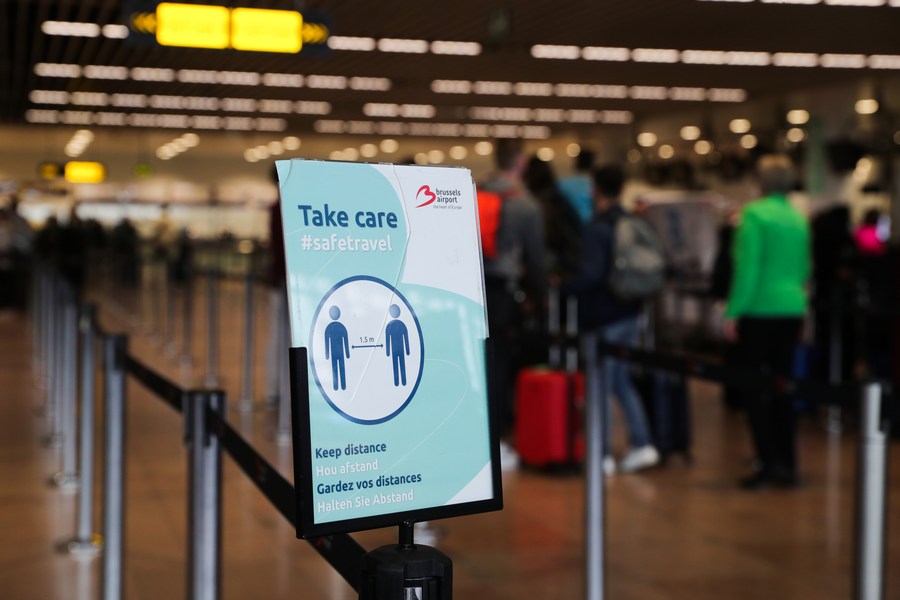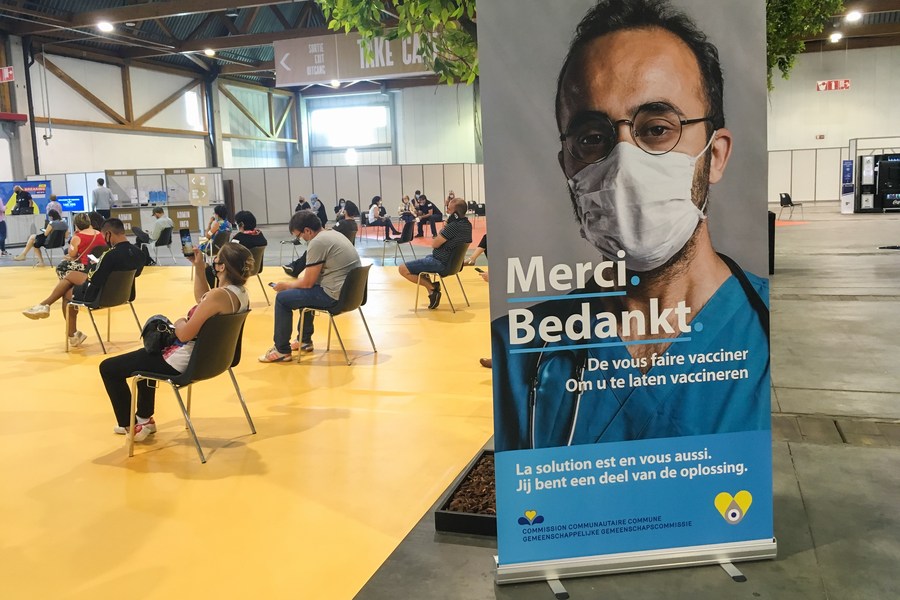WHO warns Europe to be "Delta dominant" by August, calls for more vaccines take-up

People queue up for check-in in the departure hall at the Brussels Airport in Zaventem, Belgium, July 1, 2021. (Xinhua/Zheng Huansong)
To counter the expected upsurge, Kluge again called upon the region to "remain disciplined" and for citizens to take up vaccines when offered.
"Vaccines are effective against the Delta variant. Not one dose but two doses. Delays in getting vaccinated cost lives and economies, and the slower we vaccinate, the more variants will emerge."
COPENHAGEN, July 1 (Xinhua) -- World Health Organization (WHO) Regional Director for Europe Hans Kluge on Thursday cited increased mixing, travel, gatherings, and easing of social restrictions as the main culprits ending a ten-week decline in the number of COVID-19 cases in Europe.
"Last week, the number of cases rose by 10 percent. This is taking place in the context of a rapidly evolving situation - a new variant of concern, the Delta variant - and in a region where despite tremendous efforts by the member states, millions remain unvaccinated," said Kluge at an online press conference in Copenhagen.
He noted that "Delta variant overtakes alpha very quickly through multiple and repeated introductions, and is already translating into increased hospitalizations and deaths."
The WHO European Region, according to Klug, is expected to be "Delta dominant" by August. He also warns that new variants, deficit in vaccine uptake and increased social mixing would cause a new wave of excess hospitalizations and deaths before the autumn in the region.
To counter the expected upsurge, Kluge again called upon the region to "remain disciplined" and for citizens to take up vaccines when offered.
"Vaccines are effective against the Delta variant. Not one dose but two doses. Delays in getting vaccinated cost lives and economies, and the slower we vaccinate, the more variants will emerge."
Again, Kluge lamented over the clear disparity in vaccine equality between rich and poor countries in Europe and noted that it was "unacceptable" that vaccine coverage was 24 percent throughout the entire region, "far from the recommended 80 percent coverage of the adult population."
"With these figures, nowhere is the pandemic over, and it would be very wrong for anyone - citizen and policymakers - to assume that it is."
Concerned about the current EURO 2020 tournament as a spreader event, as numbers of fans throughout the region had returned to their home countries infected with the virus, Kluge reiterated his message of caution and called upon all fans to wear masks "especially indoor and in crowds."
"The stakes are still high. COVID-19's trajectory in the coming weeks and months depends on the decisions and actions of us as individuals, communities, and as governments, we will take now and the weeks ahead, solidarity pays off!"

People wait after being vaccinated at a vaccination center in Brussels, Belgium, June 8, 2021. (Xinhua/Zheng Huansong)
Photos
Related Stories
- China eradicates malaria in 'miracle,' shows system's advantages and may offer ideas for COVID-19
- G20 members urged to jointly fight COVID
- Manufacturing solid in June
- Experts, readers speak out against unfounded reports of U.S. media on lab leak hypothesis
- Over 1.22 bln doses of COVID-19 vaccines administered in China
- China's recovery broadens as economic activities continue to normalize: WB
- Wuhan lab misportrayed by Western media, says Australian scientist
- National spirit behind China's success in fighting COVID-19, poverty
- EU, WHO launch new tool for pandemic contact tracing
- Cambodia receives another batch of China's Sinovac COVID-19 vaccine
Copyright © 2021 People's Daily Online. All Rights Reserved.










